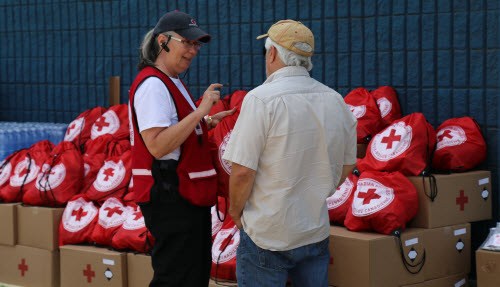
The Canadian Red Cross is committed to supporting affected individuals and communities following the 2016 Alberta fires. Experience has shown us that small businesses are essential to the full recovery of the people and communities affected by a disaster.
Real and insured losses, additional clean-up, and the extended absence of the population can threaten the livelihood of small business owners during the long process of recovery.
The intent of the Support to Small Business program is to provide support for small business owners, trades and sole proprietors who have suffered uninsured, financial loss as a result of the 2016 Alberta fires. This program aims to enhance individual and community well-being, recovery and resilience in fire-affected areas in two ways:
- Providing financial assistance for eligible small businesses to support real and actual losses
- Supporting activities such as learning opportunities and occupational training
Phased Approach for Financial Assistance
Eligible small business owners, sole proprietors, and trades people in the Regional Municipality of Wood Buffalo could receive financial support to assist with things like: uninsured losses; deductibles; minor repairs; clean-up; equipment; and occupational training expenses.
Phase 1:
Emergency financial assistance of $1,000 was provided to registered and eligible business owners who registered through the Wood Buffalo Business Recovery Hotline. This phase concluded on August 12, 2016.
Phase 2:
The purpose of this second phase of assistance was to provide financial assistance of up to $8,000 for eligible expenses to support fixed and new expenses resulting from interrupted business operations caused by the wildfires. The amount of financial assistance provided to eligible businesses was based on need, as determined through the application process. The application period for this phase concluded on January 31, 2017.
Phase 3:
Phase 3 is open to all small businesses that applied for and received assistance in Phase 2. As such, organizations will automatically be assessed for this third phase - no additional information is required from applicants.
Eligible businesses may receive up to $11,000 in financial assistance for Phase 3. The amount of financial assistance provided will be determined by the information submitted through the application process for Phase 2. The application period of Phase 2, and consequently for Phase 3, closed on January 31, 2017.
Eligibility and allocation of funds
Eligibility and the amount of financial assistance provided will be determined based upon the information submitted in the application and accompanying supporting documentation. The amount of money provided to recipients within the three phases will be based upon costs incurred as a result of the wildfires incurred after May 3, 2016.
Supporting Activities
The Red Cross will also support small businesses impacted by the wildfires with non-financial assistance through activities such as learning opportunities and occupational training. Additional information on these activities will be available in the coming weeks.
Frequently Asked Questions
1. When will the third phase of the Support to Small Business Program begin?
Starting in January, all small businesses that apply for and receive assistance in the second phase will automatically be assessed for this third phase. No additional information needs to be submitted. The application period for the second phase of the Support to Small Business Program closed on January 31, 2017.
2 .What types of expenses are eligible for the third phase of the Support to Small Business Program?
The eligible expenses for Phase 3 are the same as those for Phase 2. Eligible businesses may receive assistance of up to $8,000 for Phase 2, and will be automatically assessed for up to $11,000 in Phase 3.
All financial assistance is for actual and direct costs incurred by businesses after May 3, 2016 as a result of the wildfires and/or evacuation. The following are examples of eligible costs that may not be covered by insurance:
- Replacement of essential items such as business tools and equipment
- Assistance with clean-up expenses, moving or storage, professional cleaning and small repairs
- Assistance with overdue utility bills, lease payments and short-term lease of business equipment or vehicles
3. What are the minimum requirements to apply for the Support to Small Business Program?
Please note that the application period closed on January 31, 2017. The minimum requirements for small businesses to apply were:
- Have an active “resident” RMWB business licence *Exceptions for businesses located on First Nations’ lands
- Was operating within the RMWB on May 3, 2016
- Filed a tax return within the last 3 years reporting business income with the Canada Revenue Agency
- Be a small business defined as less than 50 employees
- Be located or headquartered in the RMWB
- Have intent to resume operations in the RMWB
- Be in need of financial assistance
4. Once I have received a notification of the decision, how and when will I receive the funds?
A cheque will be issued and mailed to you within 10 business days of the date of the determination of assistance. Cheques will be issued in the legal name of the business.
5. What supporting activities will be available to small businesses through the Support to Small Business Program?
The Support to Small Business Program will also include non-financial assistance for small businesses impacted by the fires through supporting activities, such as learning opportunities and occupational training. Additional details on these activities will be made available in the coming weeks. Please stay tuned to redcross.ca/albertafiresbusiness for the latest information.
For information about your application, please contact the help line at 1-855-RMWB-BIZ (1-855-769-2249) or email SmallBusinessSupport@marsh.com